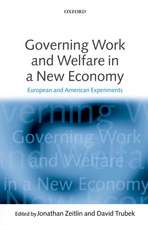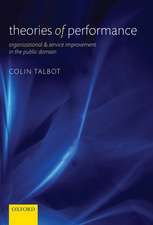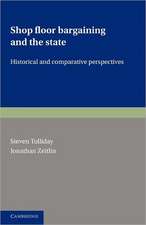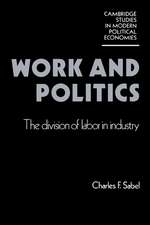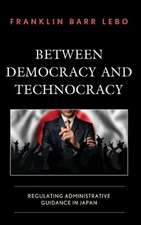Experimentalist Governance in the European Union: Towards a New Architecture
Editat de Charles F. Sabel, Jonathan Zeitlinen Limba Engleză Paperback – 16 feb 2012
| Toate formatele și edițiile | Preț | Express |
|---|---|---|
| Paperback (1) | 323.59 lei 31-38 zile | |
| OUP OXFORD – 16 feb 2012 | 323.59 lei 31-38 zile | |
| Hardback (1) | 423.73 lei 31-38 zile | |
| OUP OXFORD – 25 feb 2010 | 423.73 lei 31-38 zile |
Preț: 323.59 lei
Preț vechi: 350.65 lei
-8% Nou
Puncte Express: 485
Preț estimativ în valută:
61.92€ • 64.65$ • 51.25£
61.92€ • 64.65$ • 51.25£
Carte tipărită la comandă
Livrare economică 24-31 martie
Preluare comenzi: 021 569.72.76
Specificații
ISBN-13: 9780199604494
ISBN-10: 0199604495
Pagini: 386
Dimensiuni: 159 x 234 x 21 mm
Greutate: 0.6 kg
Editura: OUP OXFORD
Colecția OUP Oxford
Locul publicării:Oxford, United Kingdom
ISBN-10: 0199604495
Pagini: 386
Dimensiuni: 159 x 234 x 21 mm
Greutate: 0.6 kg
Editura: OUP OXFORD
Colecția OUP Oxford
Locul publicării:Oxford, United Kingdom
Notă biografică
Charles F. Sabel was formerly the Ford International Professor of Social Science at the Massachusetts Institute of Technology. His publications include Learning by Monitoring (2006, Cambridge, MA: Harvard University Press), A Constitution of Democratic Experimentalism (with Michael C. Dorf, 2006, Cambridge, MA: Harvard University Press) Can We Put an End to Sweatshops? A New Democracy Form on Raising Global Labor Standards (with Archon Fung and Dara O'Rourke, 2001, Beacon Press), Worlds of Possibility (ed. with Jonathan Zeitlin, 1997, Cambridge University Press), Ireland: Local Partnerships and Social Innovation (with the LEED Programme of the OECD, 1996), The Second Industrial Divide: Possibilities for Prosperity (with Michael Piore, 1984, Basics Books), Work and Politics: The Division of Labor in Industry (1982, Cambridge University Press). He is Professor of Law and Social Science at Columbia Law School, a post he has held since 1995.Jonathan Zeitlin was Professor of Sociology, Public Affairs, Political Science, and History at the University of Wisconsin-Madison, where he is also Directed the Center for World Affairs and the Global Economy and was Founding Director of the European Union Center. He has published extensively on new forms of governance in the European Union, as well as on comparative and historical analysis of business organization, employment relations, and public policy. He is frequently invited to provide policy advice and present his research on EU governance to European institutions, national governments, think tanks, and NGOs. Among his recent books are Changing European Employment and Welfare Regimes (Routledge, 2009); The Oxford Handbook of Business History (OUP, 2007); and The Open Method of Coordination in Action (PIE-Peter Lang, 2005). He is Professor of Public Policy and Governance in the Department of Political Science at the University of Amsterdam.
Recenzii
[T]his is an extremely ambitious, thought-provoking and timely book focusing on the problems of contemporary decision-making. It is a must-read for academics, students and policy-makers within the European Union and beyond who have an interest in our current governance architecture.




